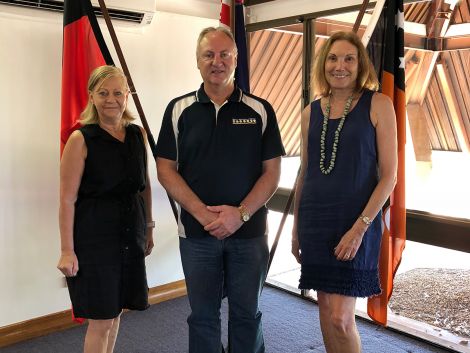Strengthening Financial Literacy for Sustainable Success
The Indigenous Financial Literacy Project focuses on enhancing the economic sustainability of Indigenous businesses through improved financial literacy. Supported by an ARC Discovery Grant, our researchers aim to identify best practices for Indigenous business owners in running successful small businesses. By comparing the financial and commercial literacy of Indigenous and non-Indigenous small business owners, the project seeks to understand the unique challenges faced by Aboriginal and Torres Strait Islander entrepreneurs.
Through an analysis of the financial performance of different business models, including independent and franchised businesses in urban, regional, and remote areas of Australia, the project aims to highlight the support and resources available to Indigenous business owners. This research is particularly significant given the historical disadvantage experienced by Australia's First Peoples in their pursuit of self-employment.
By empowering Indigenous businesses and promoting financial literacy, this project strives to create a more inclusive and equitable economic landscape, fostering sustainable growth and prosperity within Indigenous communities.
Our vision and mission
To make a significant contribution by informing the government policies by:
- Advancing the knowledge of Indigenous small business performance and the findings will be disseminated via academic conferences and journal articles.
- To provide useful information on the impact of financial and commercial literacy on small business performance to Indigenous communities both in Australia and internationally.
- To have practical outcomes that will promote the financial health and sustainability of Indigenous small businesses.
To promote financial health and sustainability of Indigenous businesses and lead to greater levels of financial literacy in Indigenous businesses in the future.
Meet the research team
Please select some Cards to display
Going beyond knowledge to empower financial well-being
Financial literacy is more about an individual's capacity to acquire financial knowledge and apply this to the financial dilemmas faced at various life stages. It also involves critical reflection about the impact of an individual’s financial decision-making and how this affects others while considering what influenced their financial decision (i.e. socio-economic status, education level, [psychological state], personal and cultural values, life stages, social standing and professional associations, media and marketing, and/or the environment). It is important to consider that many 'financially literate' individuals living on low incomes will never achieve financial well-being as the lack of knowledge is not the problem; the low wage is...
Dr Levon Blue
Our approach to research
Our ground-breaking research takes an innovative and culturally-aware approach, making it the first of its kind to thoroughly examine the facets of financial and commercial literacy within the context of Indigenous small business ownership in Australia. Recognising the importance of culturally respectful research principles, our project adheres to appropriate protocols, emphasising the social, historical, and political contexts that shape the lives of Indigenous Australians.
Both local and international studies have underscored the significance of genuine engagement with Indigenous communities, not only for research purposes but also for fostering resilience within these communities. By establishing trust, respect, and meaningful partnerships that involve co-created research, we aim to give Indigenous communities control over the research process, including the flow of information and its dissemination. Guided by the 5Rs of research—respect, relevance, reciprocity, responsibility, and relationships—we employed a comprehensive approach that included questionnaires, focus groups, and user observation studies.
In line with the research questions driving this study, our research design utilizes multiple sources and informants, ensuring a comprehensive and nuanced understanding of Indigenous financial and commercial literacy. Through this pioneering work, we strive to contribute to the empowerment and economic prosperity of Indigenous entrepreneurs while amplifying their voices, experiences, and aspirations.
The research project has been broken into three phases
This phase will involve producing a final project report which will be distributed to governmental bodies, holding a National Small Business Symposium and finalising conference papers and journal articles.
Considering the final results, the research team will investigate future research directions prior to the submission of the final report to the ARC. The project website will make all reports and resources available to interested stakeholders.
Survey (complete) and Comparative Analysis (in progress)
We have validated and augmented the variables relevant in answering each of the research questions in this study and developed a conceptual model that was empirically tested. We have:
- developed and pre-tested the survey instrument prior to collecting the data to address each of the research questions and test the hypothesised relationships. Reliable survey measures were sourced and used in item development;
- used relevant firmographic, financial and demographic items in the survey;
- ensured that there was representativeness/validation of the survey instrument via (1) expert academic panel, (2) Indigenous business groups, and (3) pilot testing (in each respondent group, i.e. Indigenous, non-Indigenous small business owners; franchised/independent business owners).
This feedback assisted in guiding the development of the final survey questionnaire.
Project Establishment and Qualitative Data Collection - Complete
The first stage of data collection was qualitative. Indigenous and non-Indigenous interview participants were recruited via introductions made through Indigenous community groups, Government and research team networks and was spread across urban, regional and remote locations in Qld, NT, NSW and Victoria. All of the research team agreed on broad research themes and determined a series of prompting questions to be used during the interview process, which formed a semi-structured interview discussion guide.
Contact Indigenous Financial Literacy Project
Enquiries:
Location:
Department of Accounting, Finance and Economics, Griffith University
Parklands Drive, Southport
Gold Coast, Queensland 4111, Australia















